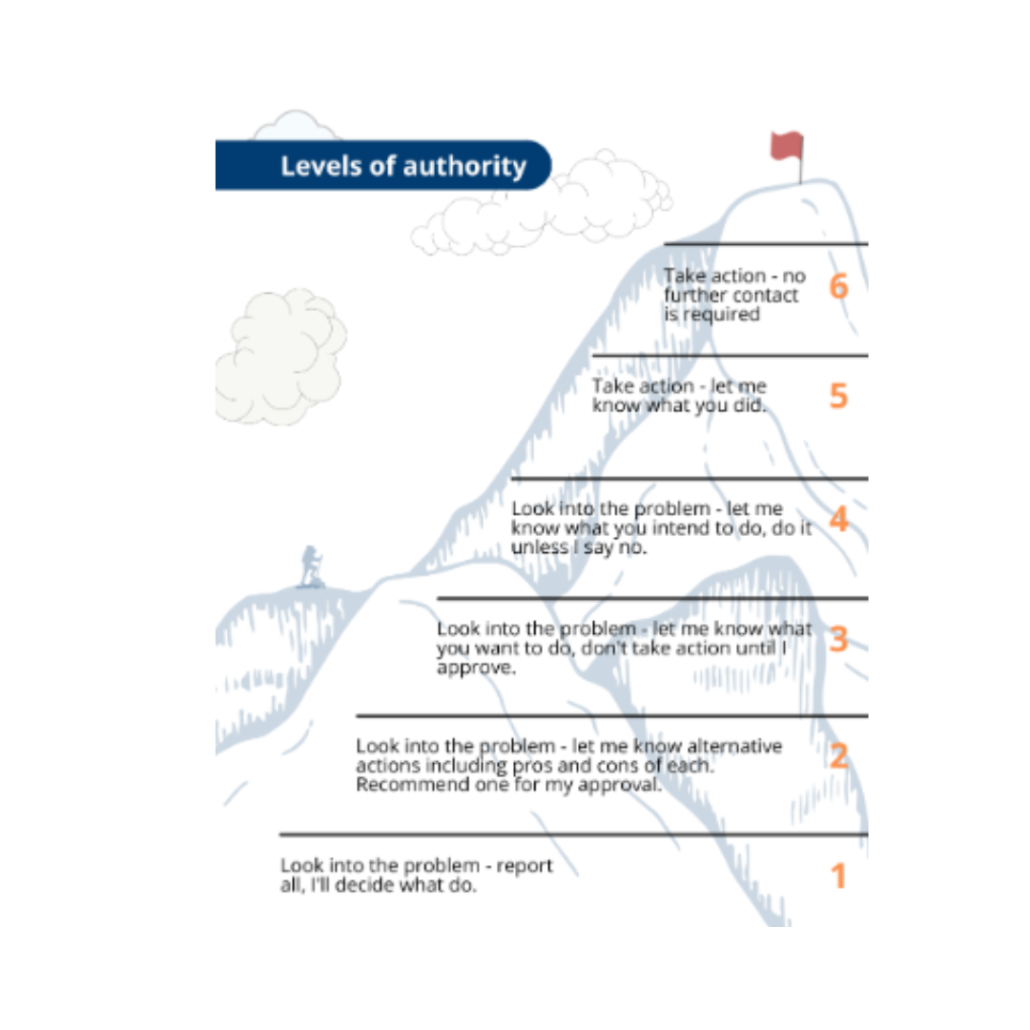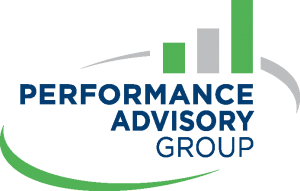In the complex landscape of leadership, effective delegation is not just about assigning tasks; it’s also about clearly communicating authority. I’ve observed that many leaders delegate authority without fully closing the loop on instructions. This oversight often leads to mistakes or delays because team members are unsure of the authority they possess. When clarity is lacking, it can hinder productivity and erode confidence.
To address this common challenge, I’d like to share a valuable model I discovered years ago, which delineates the six levels of authority every leader should follow. By understanding and implementing this model, you can provide your team with the confidence they need to take ownership of their responsibilities.

Image Credit: Slater, L. (2023, August 7). Management essentials – How to delegate effectively. The Management Centre UK. https://www.managementcentre.co.uk/learning-development/effective-delegation/
The 6 Levels of Authority
- No Authority
- At this level, team members are tasked with providing input but do not have the authority to make decisions. They may offer suggestions or feedback, but the final decision rests solely with the leader. This approach can be useful in situations where the leader needs to gather insights before making a strategic choice. However, it’s important to ensure that team members understand their role in the decision-making process to avoid frustration.
- Make Recommendations
In this scenario, team members can make recommendations based on their expertise or experience, but they still lack the authority to implement changes. Leaders can benefit from this level by gaining insights from those who are closer to the work. It’s crucial to provide feedback on these recommendations, reinforcing the importance of their input while clarifying the decision-making boundaries.
- Make Decisions Within Guidelines
At this level, team members are granted the authority to make decisions within predetermined guidelines. This empowers them to take ownership of their work while ensuring alignment with the organisation’s objectives. Leaders must communicate these guidelines clearly, establishing the boundaries within which team members can operate. Providing examples of acceptable decisions can help foster confidence and clarity.
- Make Decisions with Consultation
Here, team members can make decisions but are expected to consult with their leaders or other stakeholders beforehand. This approach balances empowerment with oversight, allowing for collaborative decision-making. It encourages open communication and ensures that decisions are well-informed. Leaders should be approachable and available for consultation to support this level of authority effectively.
- Make Decisions Independently
At this level, team members have the autonomy to make decisions without needing to consult their leaders. This level of trust can enhance job satisfaction and motivate team members to excel. However, it is essential for leaders to provide ongoing support and feedback to ensure alignment with organisational goals. Regular check-ins can help maintain communication and address any concerns that may arise.
- Act as a Leader
The highest level of authority involves team members taking on a leadership role themselves. They not only make decisions but also mentor and guide others in the organisation. This level requires a high degree of trust and confidence in the team’s abilities. Leaders should focus on developing their team members’ skills and providing opportunities for growth to facilitate this transition.
Closing the Loop on Delegation
Understanding these levels of authority is crucial for effective delegation. When delegating tasks, leaders should be clear about the authority associated with each task. Here are some practical steps to ensure clarity in delegation:
- Communicate Clearly: When assigning a task, outline the specific authority associated with it. Be explicit about what decisions the individual can make and any limitations they should be aware of.
- Provide Context: Help team members understand the rationale behind the authority they have. This context can enhance their confidence in making decisions and encourage them to take ownership of their roles.
- Encourage Questions: Foster an environment where team members feel comfortable seeking clarification. Encouraging questions can help eliminate uncertainty and reinforce understanding.
- Check In Regularly: Schedule regular check-ins to discuss progress and address any challenges team members may be facing. This ongoing support can help reinforce their confidence in exercising their authority.
As leaders, it is our responsibility to empower our teams by providing clear authority levels when delegating tasks. By following the six levels of authority, you can foster a culture of trust and accountability within your organisation. Empowering your team not only enhances their confidence but also improves overall productivity.
So, what is one area you need to focus on to improve your delegation and authority levels?
Reflect on your current practices and consider how you can better empower your team to take ownership of their work. By investing in their development and providing the necessary clarity, you can create a more effective and engaged workforce.
Now, over to you. What is one thing you can delegate this week to someone on your team? Start by identifying a task and considering who among your team would benefit most from the responsibility.
Delegating effectively not only helps you manage your workload but also strengthens your team’s capabilities and engagement. Remember, by choosing the right person, you’re setting both them and the task up for success.
Want to Learn More?
For more insights on effective leadership and delegation, be sure to check out my book, Empowering Employees Through Effective Delegation. This comprehensive guide provides practical strategies for empowering your team, fostering growth, and achieving leadership excellence. Click here to find out more and see how you can purchase a copy today.
PS – Whenever you’re ready, here are FIVE ways I can help you become a better leader…
1. Take my FREE masterclass “3 Steps to Leadership Excellence”
A step-by-step roadmap to guide you from wherever you are now on your leadership journey to becoming a truly world-class leader.
2. Read my book “Empowering Employees Through Effective Delegation”
If you lead a team, you need to master delegation. Learn how to delegate effectively and what to do if it all goes wrong.
3. Book a 15-Minute “Discovery Call”
Develop a personalised leadership development plan that will get you results in the next 6 to 12 weeks and beyond.
4. Want to up your Leadership Game to the next level? Register to our Leadership Development Program
Find out more about our Leadership Excellence Program – Equipping leaders with the necessary skills to lead high-performing teams.
5. Take our 3-minute quiz to discover your Top 10 People Leadership Strengths
Thousands of people have taken our quiz and used their strengths to achieve their goals. Take the quiz today and see what you can achieve.
FREE Resources To Get You Started

Register for our FREE Weekly Leadership Development Webinars
Keep growing, inspiring and leading. Leadership is a journey not a destination, as leaders we should continue to grow ourselves so we can grow others. Join us for our FREE webinars where you'll gain valuable tools, resources and insights. Our workshops are designed for leaders and managers who want to take their leadership to the next level.
Take our FREE People Leadership Quiz
Thousands of people have taken our quiz and used their strengths to achieve their goals. Take the quiz today and see what you can achieve.


Watch our FREE Leadership Masterclass
If you're sick of being pulled from pillar to post every day, frustrated by under performing team members, or struggling with low confidence or imposter syndrome then this new leadership masterclass training is for you. I'll share the 3 most common warning signs and 3 simple fixes and a step by step plan to help you become more confident, trusted and respected leader who delivers results.
